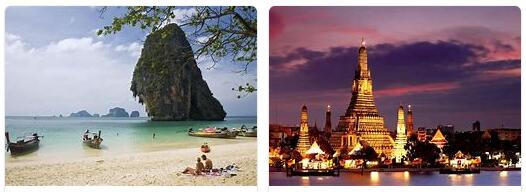Area: 513,115 sq km
Population: 69,037,513 (2017)
Population density: 135 E / km²
Government: hereditary monarchy
system of government: military government (under a constitutional monarchy)
Neighboring countries: Myanmar, Laos, Cambodia, Malaysia, (Indonesia)
State Capital: Bangkok
Language: Thai
Religions:
94% Theravada Buddhism,
5% Muslims,
0.6% Christians,
0.1% Hindus,
0.006% Jehovah’s Witnesses
Currency: Baht (THB)
1 Baht = 100 Satang
Exchange rates:
1 EUR = 36.54 THB
100 THB = 2.78 EUR
1 CHF = 32.99 THB
100 THB = 3.02 CHF
(rate from 10.03.2021)
Telephone area code: +66
Time zone: UTC + 7,
no daylight saving time
Thailand is no longer just a popular travel destination for backpackers and adventurers. More and more people are drawn to the exotic vacation paradise. Whether it’s an adventure holiday with an elephant ride through the jungle or a holiday under palm trees on the white sandy beach, with the tried and tested Thai basic language course you can prepare in advance for the culture and language of the country, so that nothing stands in the way of fluent communication.
In 2020, 786 Germans officially emigrated to Thailand and 1,317 came back to their homeland. Within the 10 years from 2010 to 2019, 16,944 Germans officially emigrated to Thailand and 14,568 moved back to Germany. The information on the number of Germans in Thailand ranges from 25,000 to almost 50,000.
Around 75 percent of the population are ethnic Thai, around 14 percent are ethnic Chinese, who, however, can hardly be distinguished from the Thai. Malays make up about 4 percent and about 7 percent are divided between Khmer, various hill tribes, refugees and migrant workers from Myanmar, Cambodia and Vietnam, as well as immigrants from all over the world. The official language is Thai, which is spoken in various dialects by the vast majority. The greater Bangkok area is the most densely populated with 4,000 residents per km²; the mountain areas of the north are most sparsely populated.
After the structural change from agriculture to a service, industry and technology-oriented economy, Thailand is increasingly relying on tourism, which now contributes over 10 percent to the gross domestic product. The most important branch of industry is the manufacture of motor vehicles and their individual parts, which is dominated by Japanese corporations. Other important branches of the economy are steel production, the manufacture of electrical and electronic equipment, the textile industry and the processing of agricultural products.
The most important types of tourism are recreational trips (along the coastal region with popular seaside resorts such as Pattaya, Phuket, Krabi and Ko Samui as well as in the northern mountains) and sightseeing trips (Bangkok and the surrounding area, northern Thailand, central plain with historical sites in and around Ayutthaya, Sukhothai, etc.).
The climate is tropical-monsoonal, with average annual temperatures in the south of 28 ° C and at Doi Inthanon, Thailand’s coolest point in the far north, 19 ° C. The seasonal fluctuations are low almost in the whole country, but there are three seasons in the north (relatively cool between November and February, very hot with temperatures well over 35 ° C from March to May and hot from May to November). The summer monsoons bring humid air masses and cause precipitation across the country. Occasionally, tropical cyclones occur in a weaker form.
In southern and western Thailand there are still species-rich tropical rainforests and in the mountain regions there are also species-rich forests. Mangrove forests sometimes thrive on the coastal waters. Numerous large mammals live in Thailand such as Asian elephants, tigers, leopards, clouded leopards, sambar deer, muntjacs, wild cattle (Gaure and Bantengs), wild boars and various species of monkeys (especially gibbons).
Sun, sandy beach, sea and affordable living costs are mainly offered to retirees and financially independent people in Thailand. Those who have to work here can only enjoy this beautiful country under certain circumstances.
Changed travel regulations during and after the corona pandemic
Entry to Thailand is basically possible for all German citizens. A special permit, the so-called Certificate of Entry (COE), is required for entry, which must be applied for online via the website of the responsible Thai diplomatic mission abroad. In addition, proof of a negative PCR test is required upon entry, which must not be older than 72 hours upon departure, as well as health insurance with coverage of at least USD 100,000, which also covers treatments for COVID-19. Visit cellphoneexplorer for Bali Or Thailand Which Would You Choose.
Travelers can obtain further information on entry regulations, in particular on the requirement for a visa, from the responsible Thai diplomatic mission abroad. A strict quarantine in a state-approved isolation facility (usually a hotel) and several COVID-19 tests are mandatory for all immigrants upon arrival and at their own expense.
For fully vaccinated travelers, entry is also possible via Phuket Airport (only direct flights to Phuket, no transit in Bangkok possible). Easier quarantine conditions apply on Phuket and on the three islands of Samui, Pha-ngan and Tao in the province of Surat Thani. Further information can be found on the website of the Thai tourism authority or from the Thai diplomatic missions abroad.
The quarantine period is 14 days for all travelers. When calculating the quarantine time, the day of arrival when entering Thailand after 6 p.m. and the day of departure are not included. The Thai embassy can provide further information on entry and quarantine regulations.
The Thai Embassy in Berlin publishes a list of approved quarantine hotels. The booking must be proven before the start of the journey. If the PCR test is positive, further isolation and, if necessary, treatment takes place in a hospital. Hospitalization and treatment are chargeable. A continuation of the quarantine in the booked quarantine hotel is then not possible. The German embassy has no influence on the measures taken in accordance with national infection protection regulations.
All travelers are obliged to register using the tracking app “Thailand Plus” before entering the country. Registration is based on the data in the Certificate of Entry. Further information can be found on the website of the Thai Consulate General in Frankfurt.




